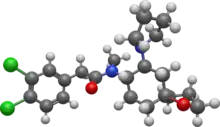 | |
 | |
| Clinical data | |
|---|---|
| Routes of administration | N/A |
| ATC code |
|
| Identifiers | |
| |
| CAS Number | |
| PubChem CID | |
| IUPHAR/BPS | |
| ChemSpider |
|
| UNII | |
| ChEMBL | |
| CompTox Dashboard (EPA) | |
| Chemical and physical data | |
| Formula | C22H30Cl2N2O2 |
| Molar mass | 425.39 g·mol−1 |
| 3D model (JSmol) | |
| |
| |
| | |
Spiradoline (U-62066) is a drug which acts as a highly selective κ-opioid agonist.[1] It has analgesic,[2] diuretic,[3] and antitussive effects,[4] and produces subjective effects in animals similar to those of ketazocine and alazocine.[5] The main effect in humans is sedation, along with analgesic and diuretic effects, but significant side effects such as dysphoria and hallucinations have stopped it from being used clinically.[6]
See also
References
- ↑ Vonvoigtlander PF, Lewis RA (July 1988). "Analgesic and mechanistic evaluation of spiradoline, a potent kappa opioid". The Journal of Pharmacology and Experimental Therapeutics. 246 (1): 259–62. PMID 2839665.
- ↑ Kunihara M, Ohyama M, Nakano M, Hayashi S (1989). "Analgesic activity of spiradoline mesylate (U-62,066E), a kappa opioid agonist in mice". Life Sciences. 45 (13): 1191–8. doi:10.1016/0024-3205(89)90508-0. PMID 2796604.
- ↑ Yamada K, Imai M, Yoshida S (January 1989). "Mechanism of diuretic action of U-62,066E, a kappa opioid receptor agonist". European Journal of Pharmacology. 160 (2): 229–37. doi:10.1016/0014-2999(89)90495-0. PMID 2547626.
- ↑ Kamei J, Tanihara H, Kasuya Y (October 1990). "Antitussive effects of two specific kappa-opioid agonists, U-50,488H and U-62,066E, in rats". European Journal of Pharmacology. 187 (2): 281–6. doi:10.1016/0014-2999(90)90014-w. PMID 2272363.
- ↑ Holtzman SG (July 2000). "Further characterization of the discriminative stimulus effects of spiradoline". Pharmacology, Biochemistry, and Behavior. 66 (3): 517–22. doi:10.1016/s0091-3057(00)00172-6. PMID 10899364. S2CID 27712517.
- ↑ Wadenberg ML (2003). "A review of the properties of spiradoline: a potent and selective kappa-opioid receptor agonist". CNS Drug Reviews. 9 (2): 187–98. doi:10.1111/j.1527-3458.2003.tb00248.x. PMC 6741666. PMID 12847558.
| μ-opioid (MOR) |
| ||||
|---|---|---|---|---|---|
| δ-opioid (DOR) |
| ||||
| κ-opioid (KOR) |
| ||||
| Nociceptin (NOP) |
| ||||
| Others |
| ||||
This article is issued from Wikipedia. The text is licensed under Creative Commons - Attribution - Sharealike. Additional terms may apply for the media files.